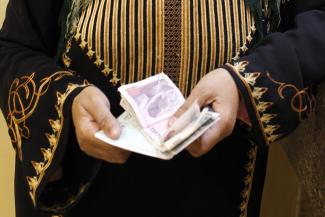European Report on Development
Linking finance to policies

The authors of the report consider what is crucial for a new kind of development financing. They argue that it is necessary to move beyond the established understanding of official development assistance (ODA). Raising ODA was appropriate to implement the agenda of the Millennium Development Goals (MDGs), they state, but in a changing global context, new sources of both public and private funding must be tapped at national and international levels. Moreover, they want policies and financing to be considered together, so best use can be made of different kinds of funding.
The new thinking needs four pillars, according to the ERD:
- It must consider all types of finance (public, private, domestic and international).
- It must recognise complementary policies (national and international).
- It must focus on change agents and enablers of long-term development.
- It must suit a vision of transformative post-2015 development.
The authors emphasise that finance itself (and ODA in particular) is not the solution. Financing options have improved considerably in recent years, the ERD states. There has been a dramatic rise not only in domestic government revenues (both tax and non-tax), but also in international public finance (including ODA). Moreover, financial markets are mobilising more money at national and international levels. Today, developing countries and emerging markets have access to $ 8 trillion more than they did when the first Financing for Development conference was held in Monterrey in 2002. Especially domestic government revenues have grown fast, according to the ERD, and are now the largest source of finance for all countries.
The key message of the ERD is: “The role of finance in promoting sustainable development needs to be seen in the policy context.” Its authors insist that there is a considerable amount of money available for development purposes, but that it is often not used appropriately and tends not to reach the poor. They have designed
- a conceptual framework for finance and policies. Core elements are:
- ensuring that sufficient capacities are in place at national and local levels for implementing policies,
- defining and enforcing standards for the public and private sectors,
- establishing a clear regulatory framework for the economy,
- providing information transparently so finances are handled with accountability and
- safeguarding policy coherence for specific development objectives.
The ERD also emphasises the importance of policies to mobilise funding and summarises principles for doing so:
- Finance should promote enablers who drive long-term change and are likely to attract additional public and private funding. Virtuous circles of this kind should be promoted. Financial support should focus on change agents in fields such as local government, infrastructure, clean energy, trade, biodiversity and others.
- To attract private capital, a country’s regulatory framework must be appropriate. It must include well-defined property rights and land titles.
- In many countries, financial-sector instruments and the capacity to apply them need to be created in order to fully mobilise private resources.
- The international policy context matters too. The international community should set the right conditions concerning transparency, trade et cetera.
In his foreword, Neven Mimica, the European commissioner for international cooperation and development, states that the ERD is a “research-based independent contribution to EU thinking and to the global debate”. The European Commission funded the report which was written by scholars from several research institutes, led by the Overseas Development Institute (ODI) in London. The ODI’s partners were the European Centre for Development Policy Management (ECDPM) in Maastricht, the German Development Institute (GDI/DIE) in Bonn, the University of Athens and the Southern Voice Network of 48 think tanks in Africa, Asia and Latin America.
Sabine Balk
Link:
European Report on Development 2015:
http://erd-report.com/erd-reports/erd5-2015/report/







